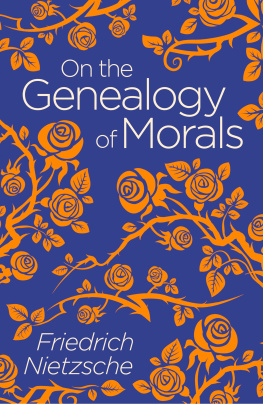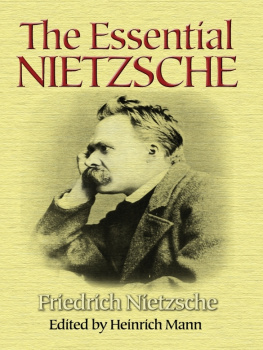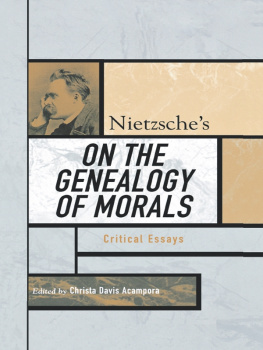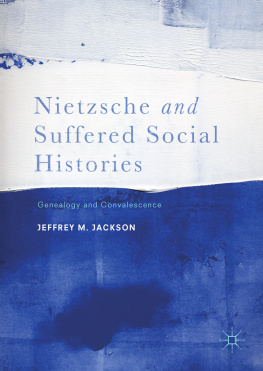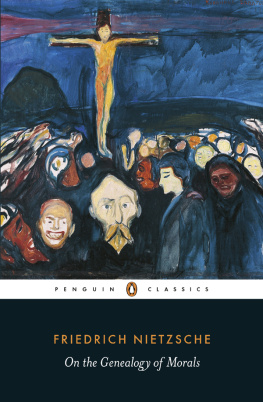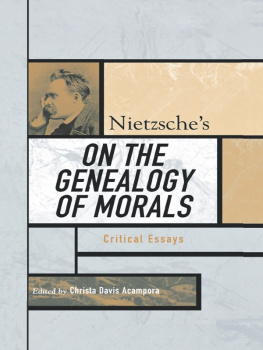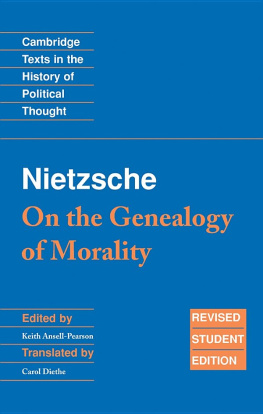Frederich Nietzsche - On the Genealogy of Morals
Here you can read online Frederich Nietzsche - On the Genealogy of Morals full text of the book (entire story) in english for free. Download pdf and epub, get meaning, cover and reviews about this ebook. year: 2020, publisher: Arcturus Digital Limited, genre: Science. Description of the work, (preface) as well as reviews are available. Best literature library LitArk.com created for fans of good reading and offers a wide selection of genres:
Romance novel
Science fiction
Adventure
Detective
Science
History
Home and family
Prose
Art
Politics
Computer
Non-fiction
Religion
Business
Children
Humor
Choose a favorite category and find really read worthwhile books. Enjoy immersion in the world of imagination, feel the emotions of the characters or learn something new for yourself, make an fascinating discovery.
- Book:On the Genealogy of Morals
- Author:
- Publisher:Arcturus Digital Limited
- Genre:
- Year:2020
- Rating:3 / 5
- Favourites:Add to favourites
- Your mark:
- 60
- 1
- 2
- 3
- 4
- 5
On the Genealogy of Morals: summary, description and annotation
We offer to read an annotation, description, summary or preface (depends on what the author of the book "On the Genealogy of Morals" wrote himself). If you haven't found the necessary information about the book — write in the comments, we will try to find it.
On the Genealogy of Morals — read online for free the complete book (whole text) full work
Below is the text of the book, divided by pages. System saving the place of the last page read, allows you to conveniently read the book "On the Genealogy of Morals" online for free, without having to search again every time where you left off. Put a bookmark, and you can go to the page where you finished reading at any time.
Font size:
Interval:
Bookmark:
Friedrich Nietzsche was born on 15 October 1844 in the small Prussian town of Rcken bei Ltzen in Saxony. His father, Karl Ludwig, was appointed Rckens Lutheran minister by King Friedrich Wilhelm IV. In 1849, Karl died and the family moved to Naumburg, where Nietzsche lived with his mother, sister, grandmother and two aunts. In 1858, he was accepted into the Schulpforta, one of Germanys most prestigious boarding schools.
Upon graduating in 1864, Nietzsche enrolled as a theology and classical philology student at the University of Bonn. Two terms later, he transferred to the University of Leipzig to follow Professor Friedrich Wilhelm Ritschl. Under Ritschls tutelage Nietzsche thrived in Leipzig, learning the philosophy of Arthur Schopenhauer and Immanuel Kant.
In 1869, Ritschl recommended the 24-year-old Nietzsche for a professorship in philology at the University of Basel. Basel was hesitant; Nietzsche had left the university for a year of military service and hadnt completed his doctoral thesis. But Ritschl heaped praise on Nietzsche, stating that he hadnt found another student like him in 40 years of teaching. So the University of Basel appointed him as an extraordinary professor of classical philology, and promoted him to full professor the following year.
Nietzsche took leave in August 1870 to work as a medical orderly during the Franco-German War. While helping transport the wounded, he contracted dysentery and diphtheria, which resulted in poor health, migraines, insomnia and near blindness for the rest of his life. In October, he returned to university, but found himself struggling between his deteriorating health and the demands of teaching. In 1879, he resigned from his position at the age of 34.
While he battled with illness between 1883 and 1885, he wrote Thus Spake Zarathustra, intended to be the culmination of his philosophical career. The work received a poor reception initially, leading Nietzsche to rework his ideas into Beyond Good and Evil in 1886. A year later, he published On the Genealogy of Morals, a collection of essays on the history of ethics and morality, hoping to draw attention to his earlier works. In these essays, he explored the binary divisions of good and evil and questioned the Christian and humanist foundations of the ideas that governed late-19th- century Europe. Through these writings, he aimed to show that the ethical assumptions people took for granted were not absolute, timeless dictates but had evolved from a conflict of different value systems. The radical, sometimes disturbing, arguments he presented in this book made it one of the most important works of modern European philosophy.
Two years after its publication, Nietzsche suffered a nervous breakdown and spent a number of years in psychiatric asylums, before returning to live with his mother until her death in 1897. He then moved into the household of his sister Elisabeth and her husband Bernhard Frster, a politically active anti-Semite. After Frsters suicide in 1889, Elisabeth worked diligently to keep her husbands racist philosophy alive. While living with his sister, Nietzsches health continued to worsen. He suffered a number of strokes before eventually succumbing to pneumonia in 1900. Control of his estate passed to Elisabeth, and she attempted to use Nietzsches writings to paint him as a supporter of Frsters work.
But in truth, Nietzsche offered an insightful and open-minded view of mans spirituality. Contrary to the hateful message of his sister, he aimed to broaden the minds of his readers and urged them to take control of their own lives.
We are unknown, we knowers, ourselves to ourselves: this has its own good reason. We have never searched for ourselves how should it then come to pass, that we should ever find ourselves? Rightly has it been said: Where your treasure is, there will your heart be also. Our treasure is there, where stand the hives of our knowledge. It is to those hives that we are always striving; as born creatures of flight, and as the honey-gatherers of the spirit, we care really in our hearts only for one thing to bring something home to the hive!
As far as the rest of life with its so-called experiences is concerned, which of us has even sufficient serious interest? or sufficient time? In our dealings with such points of life, we are, I fear, never properly to the point; to be precise, our heart is not there, and certainly not our ear. Rather like one who, delighting in a divine distraction, or sunken in the seas of his own soul, in whose ear the clock has just thundered with all its force its twelve strokes of noon, suddenly wakes up, and asks himself, What has in point of fact just struck? so do we at times rub afterwards, as it were, our puzzled ears, and ask in complete astonishment and complete embarrassment, Through what have we in point of fact just lived? further, Who are we in point of fact? and count, after they have struck, as I have explained, all the twelve throbbing beats of the clock of our experience, of our life, of our being ah! and count wrong in the endeavour. Of necessity we remain strangers to ourselves, we understand ourselves not, in ourselves we are bound to be mistaken, for of us holds good to all eternity the motto, Each one is the farthest away from himself as far as ourselves are concerned we are not knowers.
My thoughts concerning the genealogy of our moral prejudices for they constitute the issue in this polemic have their first, bald, and provisional expression in that collection of aphorisms entitled Human, all-too-Human, a Book for Free Minds, the writing of which was begun in Sorrento, during a winter which allowed me to gaze over the broad and dangerous territory through which my mind had up to that time wandered. This took place in the winter of 1876-77; the thoughts themselves are older. They were in their substance already the same thoughts which I take up again in the following treatises: we hope that they have derived benefit from the long interval, that they have grown riper, clearer, stronger, more complete. The fact, however, that I still cling to them even now, that in the meanwhile they have always held faster by each other, have, in fact, grown out of their original shape and into each other, all this strengthens in my mind the joyous confidence that they must have been originally neither separate disconnected capricious nor sporadic phenomena, but have sprung from a common root, from a fundamental fiat of knowledge, whose empire reached to the souls depth, and that ever grew more definite in its voice, and more definite in its demands. That is the only state of affairs that is proper in the case of a philosopher.
We have no right to be disconnected; we must neither err disconnectedly nor strike the truth disconnectedly. Rather with the necessity with which a tree bears its fruit, so do our thoughts, our values, our Yess and Nos and Ifs and Whethers, grow connected and interrelated, mutual witnesses of one will, one health, one kingdom, one sun as to whether they are to your taste, these fruits of ours? But what matters that to the trees? What matters that to us, us the philosophers?
Owing to a scrupulosity peculiar to myself, which I confess reluctantly it concerns indeed morality a scrupulosity, which manifests itself in my life at such an early period, with so much spontaneity, with so chronic a persistence and so keen an opposition to environment, epoch, precedent, and ancestry that I should have been almost entitled to style it my priori my curiosity and my suspicion felt themselves betimes bound to halt at the question, of what in point of actual fact was the
Font size:
Interval:
Bookmark:
Similar books «On the Genealogy of Morals»
Look at similar books to On the Genealogy of Morals. We have selected literature similar in name and meaning in the hope of providing readers with more options to find new, interesting, not yet read works.
Discussion, reviews of the book On the Genealogy of Morals and just readers' own opinions. Leave your comments, write what you think about the work, its meaning or the main characters. Specify what exactly you liked and what you didn't like, and why you think so.

